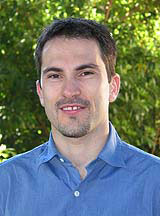The University of California, Santa Cruz, has received a $1.5 million grant from the W. M. Keck Foundation to establish the W. M. Keck Center for Nanoscale Optofluidics. A joint endeavor of the Jack Baskin School of Engineering and the Division of Physical and Biological Sciences at UCSC, the center explores the integration of nanotechnology and optofluidic silicon chips and how this technology can be used to improve biomedical analysis in a wide range of fields, including toxicology, immunology, disease detection, and diagnostics.
"Being able to analyze single biomolecules is essential to improving our fundamental understanding of life and to developing a new generation of ultrasensitive instruments to detect diseases," said Holger Schmidt, associate professor of electrical engineering and director of the center. "We have developed an optofluidic platform that enables us to detect single molecules and particles on a chip without the need for bulky microscopes. The Keck Foundation grant provides the financial resource to establish the nanofabrication capabilities required to define nanoscale features on optofluidic chips and take this platform to a new level. We can now conduct benchmark studies in molecular biology to verify the potential of this approach."
The interdisciplinary team led by Schmidt is composed of faculty from five UCSC departments: Mark Akeson, professor of biomolecular engineering; David Deamer, professor emeritus of biomolecular engineering; William Dunbar, assistant professor of computer engineering; Harry Noller, Sinsheimer Professor of Molecular Biology; and Jin Zhang, professor of chemistry and biochemistry. The center grew out of earlier collaborations between these investigators funded in part by a Keck Futures Nanotechnology Grant Schmidt received in 2005.
"The W. M. Keck Foundation's commitment to high-risk research, especially in these economic times, is remarkable," said Michael Isaacson, acting dean of Baskin Engineering and Narinder Singh Kapany Professor of Optoelectronics. "Dr. Schmidt and the team clearly have demonstrated the tremendous potential for developing instrumentation that is portable, inexpensive, and fast. We are grateful that the foundation recognizes this potential."
Based in Los Angeles, the W. M. Keck Foundation was established in 1954 by the late W. M. Keck, founder of the Superior Oil Company. The foundation's grant making is focused primarily on pioneering efforts in the areas of medical research, science, and engineering. The foundation also maintains a program to support undergraduate science and humanities education and a Southern California Grant Program that provides support in the areas of health care, civic and community services, education, and the arts, with a special emphasis on children and youth.
UCSC's Jack Baskin School of Engineering prepares technologists--and sponsors technology--for our changing world. Founded in 1997, Baskin Engineering trains students in six future-focused areas of engineering: biotechnology/information technology/ nanotechnology; bioengineering; information and communication infrastructure; mathematical and statistical modeling; software and services engineering; and system design. Baskin Engineering faculty conduct industry-leading research that is improving the way the world does business, treats the environment, and nurtures humanity.



